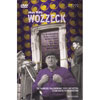Berg Wozzeck
Cast and concept united in a gripping telling of Berg’s claustrophobic tale
View record and artist detailsRecord and Artist Details
Composer or Director: Alban Berg
Genre:
Opera
Label: Arthaus Musik
Magazine Review Date: 6/2007
Media Format: Digital Versatile Disc
Media Runtime: 106
Mastering:
Mono
Catalogue Number: 101 277

Tracks:
| Composition | Artist Credit |
|---|---|
| Wozzeck |
Alban Berg, Composer
Alban Berg, Composer Bruno Maderna, Conductor Elisabeth Steiner, Margret, Contralto (Female alto) Franz Grundheber, Apprentice II, Baritone Gerhard Unger, Captain, Tenor Hamburg State Opera Chorus Hamburg State Philharmonic Orchestra Hans Sotin, Doctor, Bass Kurt Marschner, Idiot, Tenor Kurt Moll, Apprentice I, Bass Peter Haage, Andres, Tenor Richard Cassilly, Drum Major, Tenor Sena Jurinac, Marie, Soprano Toni Blankenheim, Wozzeck, Baritone |
Author: Peter Quantrill
Wozzeck is perfect for the small screen, as the composer and intendant Rolf Liebermann intuited when he made his seventh and, he thought, best TV opera film by decamping the Hamburg State Opera to a castle in southern Germany. The many short scenes, abrupt shifts of perspective and concentrated dialogue are no more or less macabre, pitiful and comic than a month in the life of Weatherfield’s Coronation Street. Willi Reich points out in his monograph on the composer that Wie arme Leut (“We Poor People”) “summarises the whole social milieu of the work”. Just so, the orchestra squeezes into your sitting room like a busy night at the Rovers Return.
Liebermann could not have picked a better conductor for the job. Bruno Maderna’s studies with Hermann Scherchen, his uneasy blood-brotherhood with Boulez and the Darmstadt bunch and his own creative analysis of Renaissance music in performance and composition make him ideally equipped to eschew the broad strokes of an opera-house production, even one as finely tuned as Abbado’s, for a more expansive, analytical approach that zeros in on the structural fundamentals of Berg’s score just as the camera registers every flicker of naivety (Andres), lust (Marie) and uncomprehending despair (Wozzeck) in relentless close-up.
Toni Blankenheim followed Liebermann to Paris to sing Schigolch in the premiere of Cerha’s completion of Lulu. Here he presents a noble, wretched Everyman, more Gobbi (Rome, 1954) than Goerne (Covent Garden, 2002), one who only at the last buckles under torment into insanity. Sena Jurinac plays Marie in the tradition of lighter voices such as Danco and Seefried, more agile and believably seductive-pathetic than the Wagnerian assumptions by (say) Polaski or Behrens.
The remainder of the cast has strength in depth, and they all heed Berg’s injunction to treat their lines as though singing Il trovatore instead of his Sprechstimme instructions in the score: even Gerhard Unger’s hysterically admonishing Captain is sung rather than shrieked.
The considerable problems of the TV opera enterprise are overcome, triumphantly so: synchronisation is almost perfect, and the total commitment of all the singers is such as to suspend disbelief when their voices are coming from a generous studio acoustic while we see them outdoors – often with breath visible in the chill. It is an oppressively claustrophobic, deeply sobering experience, and so it should be.
Liebermann could not have picked a better conductor for the job. Bruno Maderna’s studies with Hermann Scherchen, his uneasy blood-brotherhood with Boulez and the Darmstadt bunch and his own creative analysis of Renaissance music in performance and composition make him ideally equipped to eschew the broad strokes of an opera-house production, even one as finely tuned as Abbado’s, for a more expansive, analytical approach that zeros in on the structural fundamentals of Berg’s score just as the camera registers every flicker of naivety (Andres), lust (Marie) and uncomprehending despair (Wozzeck) in relentless close-up.
Toni Blankenheim followed Liebermann to Paris to sing Schigolch in the premiere of Cerha’s completion of Lulu. Here he presents a noble, wretched Everyman, more Gobbi (Rome, 1954) than Goerne (Covent Garden, 2002), one who only at the last buckles under torment into insanity. Sena Jurinac plays Marie in the tradition of lighter voices such as Danco and Seefried, more agile and believably seductive-pathetic than the Wagnerian assumptions by (say) Polaski or Behrens.
The remainder of the cast has strength in depth, and they all heed Berg’s injunction to treat their lines as though singing Il trovatore instead of his Sprechstimme instructions in the score: even Gerhard Unger’s hysterically admonishing Captain is sung rather than shrieked.
The considerable problems of the TV opera enterprise are overcome, triumphantly so: synchronisation is almost perfect, and the total commitment of all the singers is such as to suspend disbelief when their voices are coming from a generous studio acoustic while we see them outdoors – often with breath visible in the chill. It is an oppressively claustrophobic, deeply sobering experience, and so it should be.
Discover the world's largest classical music catalogue with Presto Music.

Gramophone Digital Club
- Digital Edition
- Digital Archive
- Reviews Database
- Full website access
From £8.75 / month
Subscribe
Gramophone Full Club
- Print Edition
- Digital Edition
- Digital Archive
- Reviews Database
- Full website access
From £11.00 / month
Subscribe
If you are a library, university or other organisation that would be interested in an institutional subscription to Gramophone please click here for further information.




